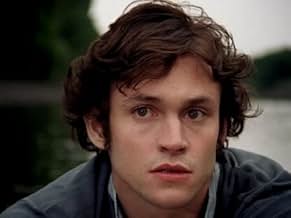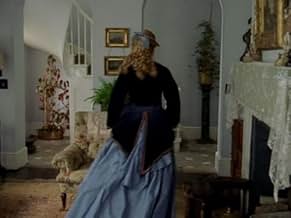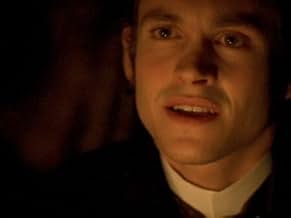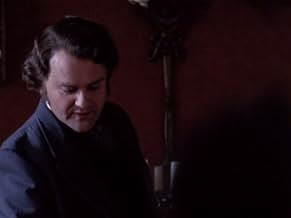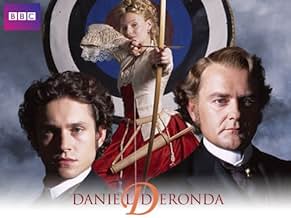Daniel Deronda
- Miniserie
- 2002
- 53 Min.
IMDb-BEWERTUNG
7,2/10
5310
IHRE BEWERTUNG
Füge eine Handlung in deiner Sprache hinzuSet in Victorian London, Gwendolen Harleth is drawn to Daniel Deronda, a selfless and intelligent gentleman of unknown parentage, but her own desperate need for financial security may destro... Alles lesenSet in Victorian London, Gwendolen Harleth is drawn to Daniel Deronda, a selfless and intelligent gentleman of unknown parentage, but her own desperate need for financial security may destroy her chance at happiness.Set in Victorian London, Gwendolen Harleth is drawn to Daniel Deronda, a selfless and intelligent gentleman of unknown parentage, but her own desperate need for financial security may destroy her chance at happiness.
- 3 BAFTA Awards gewonnen
- 5 Gewinne & 4 Nominierungen insgesamt
Folgen durchsuchen
Handlung
WUSSTEST DU SCHON:
- WissenswertesThe novel is set in the early 1860s, whereas the adaptation moves the action ahead to 1874, the year that George Eliot began writing the novel.
- PatzerAt Ezra Cohen's store, the baby's left shoe and sock disappear then reappear.
- VerbindungenFeatured in George Eliot: A Scandalous Life (2002)
Ausgewählte Rezension
Mary Anne Evans finished writing "Daniel Deronda" in 1876. It was the last of several novels she wrote under the pen name, George Eliot. She was 57 at the time and would live but four more years. Among more than 40 fiction writers of the period, Eliot was one of the great chroniclers of 19th century English society (Georgian-Victorian).
"Deronda" is also the last of Eliot's books to be scripted for a movie. This rendition by the BBC in three parts is excellent. For the fairly recent filming - 2002, the film makers were able to capture the England of the 1870s very well. The cinematography was excellent, as were the script and direction. The acting was first-rate by the entire cast. As some others have mentioned, Hugh Bonneville excelled in his role of a shrewd, mean, heartless "villain," under the guise of a calm, but indifferent gentleman. Romola Garai and Jodhi May were perfect in their roles, and Hugh Dancy was superb in his slight reserve and humility, matching the character in the book. Edward Fox was on the mark in his supporting role, and all the rest of the cast were terrific.
My rating is down one point from a 10 only because of the slight disjointedness in the film. Others have commented on the appearance of two films together, and the difficulty of interweaving them. It wasn't a distraction, but it was noticeable - as though the script should have given us smoother connections between stories. But this is a tremendous film and most enjoyable foray into Victorian England.
I have to give Eliot kudos for one more thing that no one else seemed to comment on. That was the dialog around the table during the Jewish meal. Mordecai said that the Jews would not reach an end to their low esteem until they had a land of their own - in the eastern Mediterranean. What great foresight by a writer 75 years before the worldwide emigration of Jews to the Holy Land after World War II, and the establishment of modern Israel in the late 1940s.
I compliment the BBC for putting Eliot's great books on film, starting in the 1990s. Anglophiles and all of us who enjoy great movies and stories, will cherish these films for years to come. They are a great way to expose the young generation of today with some of the great literature and history of 19th century England.
The world would indeed have loved to have more of Eliot, Charles Dickens, Charlotte Bronte, Jane Austen, Anthony Trollope and Lewis Carroll (Charles Dodgson). Most of them lived a little to a lot longer than the average age of life expectancy at the time. In 1850, that was 40 for males and 42 for females. Trollope (1815-1882) lived to be 67. Eliot (1819-1880) lived to be 61. And Carroll (1822-1898) was 66 when he died. Dickens also beat the average age of death, living to 58 from 1812-1870. But Austen (1775-1817) and Bronte (1816-1855), lived to only 42 and 39, respectively.
"Deronda" is also the last of Eliot's books to be scripted for a movie. This rendition by the BBC in three parts is excellent. For the fairly recent filming - 2002, the film makers were able to capture the England of the 1870s very well. The cinematography was excellent, as were the script and direction. The acting was first-rate by the entire cast. As some others have mentioned, Hugh Bonneville excelled in his role of a shrewd, mean, heartless "villain," under the guise of a calm, but indifferent gentleman. Romola Garai and Jodhi May were perfect in their roles, and Hugh Dancy was superb in his slight reserve and humility, matching the character in the book. Edward Fox was on the mark in his supporting role, and all the rest of the cast were terrific.
My rating is down one point from a 10 only because of the slight disjointedness in the film. Others have commented on the appearance of two films together, and the difficulty of interweaving them. It wasn't a distraction, but it was noticeable - as though the script should have given us smoother connections between stories. But this is a tremendous film and most enjoyable foray into Victorian England.
I have to give Eliot kudos for one more thing that no one else seemed to comment on. That was the dialog around the table during the Jewish meal. Mordecai said that the Jews would not reach an end to their low esteem until they had a land of their own - in the eastern Mediterranean. What great foresight by a writer 75 years before the worldwide emigration of Jews to the Holy Land after World War II, and the establishment of modern Israel in the late 1940s.
I compliment the BBC for putting Eliot's great books on film, starting in the 1990s. Anglophiles and all of us who enjoy great movies and stories, will cherish these films for years to come. They are a great way to expose the young generation of today with some of the great literature and history of 19th century England.
The world would indeed have loved to have more of Eliot, Charles Dickens, Charlotte Bronte, Jane Austen, Anthony Trollope and Lewis Carroll (Charles Dodgson). Most of them lived a little to a lot longer than the average age of life expectancy at the time. In 1850, that was 40 for males and 42 for females. Trollope (1815-1882) lived to be 67. Eliot (1819-1880) lived to be 61. And Carroll (1822-1898) was 66 when he died. Dickens also beat the average age of death, living to 58 from 1812-1870. But Austen (1775-1817) and Bronte (1816-1855), lived to only 42 and 39, respectively.
Top-Auswahl
Melde dich zum Bewerten an und greife auf die Watchlist für personalisierte Empfehlungen zu.
- How many seasons does Daniel Deronda have?Powered by Alexa
Details
- Erscheinungsdatum
- Herkunftsländer
- Offizielle Standorte
- Sprache
- Auch bekannt als
- 丹尼爾的半生緣
- Drehorte
- Edinburgh, Schottland, Vereinigtes Königreich(Jewish market scenes)
- Produktionsfirmen
- Weitere beteiligte Unternehmen bei IMDbPro anzeigen
Zu dieser Seite beitragen
Bearbeitung vorschlagen oder fehlenden Inhalt hinzufügen


